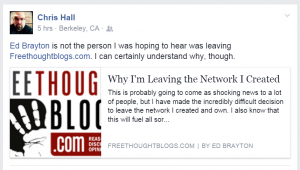I have to reply to some of the garbage that’s being spewed on PZ’s post about me from yesterday. I’m going to do it here because – oh well the reason’s obvious.
It’s all people who have been examining everything they can see of my Facebook activity going back months – which is creepy and disgusting all by itself. Even if I’m a raving Republican, that’s creepy and disgusting. Since I’m not, it’s all the more so. (If I were a Republican lobbyist or politician or influential think-tanker, ok, fair game, but a minor blogger? Not such fair game.)
One major item in the indictment: I read and sometimes comment in a Facebook group called Discussing gender critical & gender identity. It’s an open group. At the top of the group’s page it has a note on rules, which starts with this:
This group offers a space for people with very different views about “gender” and “gender identity” to engage in respectful discussion. We require people to be civil and we request that group members listen to one another. The point of the group is to foster dialogue and allow for a broader discussion of these issues between those who advocate for gender identity, those who hold gender critical or abolitionist views and those who are exploring and/or undecided.
It has a range of views. Nobody agrees with all of them, because that would be incoherent. It has some interesting discussions, with people who disagree with each other. I don’t agree with everything said there (see above), to say the least. I don’t endorse the group, and neither do I denounce it. I think I have a right to read posts in the group and even (gasp) comment on them without being hauled before the Court of Asshole Opinion.
People have told me Elizabeth Hungerford, one of the admins, is a TERF…but then I’ve learned to be wary of that label, because I’m not sure it’s applied carefully in all cases. In any case I’m not endorsing her, or denouncing her either. People have pointed out that letter to the UN – that looks like a bad idea to me, but I don’t know enough about it to pronounce on it. Elizabeth friend requested me on Facebook and I accepted. That doesn’t mean we go to each other’s houses and put our jammies on and talk about boys – it means we can see each other’s walls. I’m pretty sure I disagree with plenty of her ideas, but then…that’s the case with everyone. Yes, it’s a matter of degree, but I’m still not convinced that this is something the Pharyngula Horde gets to decide for me.
I have on occasion made a joke in that group. The people on PZ’s post are brandishing a couple of those jokes as evidence of my thoughtcriminality. This is how low we’ve sunk – or maybe it’s how low we’ve always been, I don’t even know at this point.
I make jokes about things all the time. I say flippant things. I try not to do it on sensitive subjects, but sometimes I get that wrong.
Well obviously someone like that doesn’t belong on Freethought Blogs. The horror!
And then there’s this one from someone called “Thumper” –
From anteprepro’s link at #101
Ophelia Benson: I know. The TERF panic is a horribly effective silencer.
Oh my god, NO!! How could I possibly have said that?! It’s so obviously NOT TRUE at all in any way!!!
You could not make it up.
(This is a syndicated post. Read the original at FreeThoughtBlogs.)










